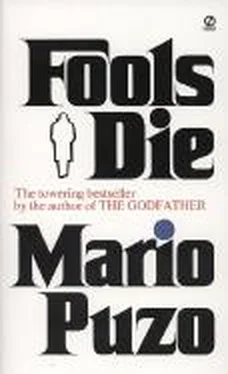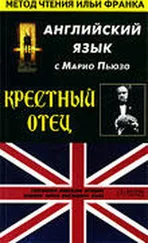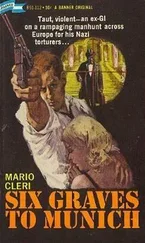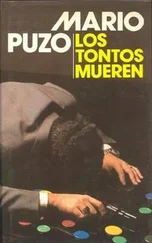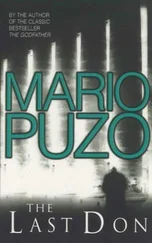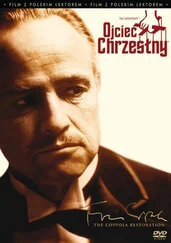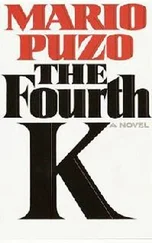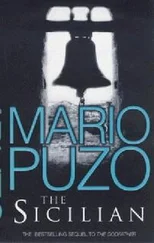Mario Puzo - Fools die
Здесь есть возможность читать онлайн «Mario Puzo - Fools die» весь текст электронной книги совершенно бесплатно (целиком полную версию без сокращений). В некоторых случаях можно слушать аудио, скачать через торрент в формате fb2 и присутствует краткое содержание. Жанр: Современная проза, на английском языке. Описание произведения, (предисловие) а так же отзывы посетителей доступны на портале библиотеки ЛибКат.
- Название:Fools die
- Автор:
- Жанр:
- Год:неизвестен
- ISBN:нет данных
- Рейтинг книги:3 / 5. Голосов: 1
-
Избранное:Добавить в избранное
- Отзывы:
-
Ваша оценка:
- 60
- 1
- 2
- 3
- 4
- 5
Fools die: краткое содержание, описание и аннотация
Предлагаем к чтению аннотацию, описание, краткое содержание или предисловие (зависит от того, что написал сам автор книги «Fools die»). Если вы не нашли необходимую информацию о книге — напишите в комментариях, мы постараемся отыскать её.
Fools die — читать онлайн бесплатно полную книгу (весь текст) целиком
Ниже представлен текст книги, разбитый по страницам. Система сохранения места последней прочитанной страницы, позволяет с удобством читать онлайн бесплатно книгу «Fools die», без необходимости каждый раз заново искать на чём Вы остановились. Поставьте закладку, и сможете в любой момент перейти на страницу, на которой закончили чтение.
Интервал:
Закладка:
With Osano, the management knew it was home free. Osano was right-handed all the way. He loved women, all sizes and shapes, any age. The smell of cunt turned him on like a junkie. He fucked broads as devotedly as a heroin addict taking a fix. If Osano didn’t get his piece of ass that day or at least a blow job, he’d get frantic. But he wasn’t an exhibitionist. He’d always lock his office door. Sometimes a bookish teenybopper. Other times a society broad who thought he was the greatest living American writer. Or a starving female novelist who needed some books to review to keep body and soul and ego together. He was shameless in using his leverage as editor, his fame as a world-renowned novelist and what proved to be the busiest bee in his bonnet, a contender for the Nobel Prize in literature. He said it was the Nobel Prize that got the really intellectual ladies. And for the last three years he had mounted a furious campaign for the Nobel with the help of all his literary friends, he could show these ladies articles in classy quarterlies touting him for the prize.
Oddly enough Osano had no ego about his own physical charms-his personal magnetism. He dressed well, spent good money on clothes, yet it was trim he was not physically attractive. His face was all lopsided bone, and his eyes were a pale, sneaky green. But he discounted his vibrant aliveness that was magnetic to all people. Indeed, a great deal of his fame rested not on his literary achievement but on his personality, which included a quick, brilliant intelligence that was attractive to men as well as women.
But the women went crazy for him; bright college girls, well-read society matrons, Women’s Lib fighters who cursed him out and then tried to get him in the sack so they could have it on him, so they said, the, way men used to have it on women in Victorian days. One of his tricks was to address himself to women in his books.
I never liked his work, and I didn’t expect to like him. The work is the man. Except that it proved not to be true. After all, there are some compassionate doctors, curious teachers, honest lawyers, idealistic politicians, virtuous women, sane actors, wise writers. And so Osano, despite his fishwife style, the spite in his work, was in reality a great guy to hang out with and not too much of a pain in the ass to listen to, even when he talked about his writing.
Anyway, he had quite an empire as editor of the book review. Two secretaries. Twenty staff readers. And a great outdoors of free-lance critics from top-name authors to starving poets, unsuccessful novelists, college professors and jet-set intellectuals. He used them all and hated them all. And he ran the review like a lunatic.
Page one of the Sunday review is something an author kills for. Osano knew that. He got the first page automatically when he published a book, in all the book reviews in the country. But he hated most fiction writers, he was jealous of them. Or he would have a grudge against the publisher of the book. So he would get a biography of Napoleon or Catherine the Great written by a heavyweight college professor and put it on page one. Book and review usually were both equally unreadable, but Osano was happy. He had infuriated everybody.
The first time I ever saw Osano he lived up to all the literary party stories, all the gossip, all the public images he had ever created. He played the role of the great writer for me with a natural gusto. And he had the props to suit the legend.
I went out to the Hamptons, where Osano took a summer house, and found him ensconced (his word) like an old sultan. At fifty years of age, he had six kids from four different marriages and at that time had not gotten his fifth, sixth and terminal seventh notch. He had on long blue tennis pants and blue tennis jacket specially tailored to hide his bulging beer gut. His face was already craggily impressive, as befitted the next winner of the Nobel Prize for literature. Despite his wicked green eyes, he could be naturally sweet. Today he was sweet. Since he was head of the most powerful Sunday literary review, everybody kissed his ass with the utmost devotion every time he published. He didn’t know I was out to kill him, because I was an unsuccessful writer with one flop novel published and the second coming hard. Sure, he’d written one big almost great novel. But the rest of his work was bullshit, and if Everyday Life let me, I’d show the world what this guy was really made of.
I wrote the article all right, and I caught him dead to rights. But Eddie Lancer turned it down. They wanted Osano to do a big political story, and they didn’t want him to get mad. So it was a day wasted. Except that it really wasn’t. Because two years later Osano called me up and offered me a job working for him as assistant on a new big literary review. Osano remembered me, had read the story the magazine killed, and he liked my guts, or so he said. He said it was because I was a good writer and I liked the same things about his work that he liked.
That first day we sat in his garden and watched his kids play tennis. I have to say right now he really loved his kids and he was perfect with them. Maybe because he was so much a child himself. Anyway, I got him talking about women and Women’s Lib and sex. And he threw in love with it. He was pretty funny. And though in his writings he was the great all-time left-winger, he could be pretty Texas chauvinistic. Talking about love, he said that once he fell in love with a girl he always stopped being jealous of his wife. Then he put on his big writer-statesman look and said, “No man is allowed to be jealous of more than one woman at a time– unless he’s Puerto Rican.” He felt he was allowed to make jokes about Puerto Ricans because his radical credentials were impeccable.
The housekeeper came out to yell at the children fighting for a game on the tennis court. She was a pretty bossy housekeeper and pretty snotty with the kids, as if she were their mother. She also was a handsome woman for her age, which was about Osano’s. For a moment I wondered. Especially when she gave us both a contemptuous look before she went back into the house.
I got him talking about women, which was easy. He took the cynic’s stance, which is always a great stance to take when you’re not crazy about some particular lady. He was very authoritative, as befitted a writer who had had more gossip written about him than any novelist since Hemingway.
“Listen, kid,” he said, “love is like the little red toy wagon you get for Christmas or your sixth birthday. It makes you deliriously happy and you just can’t leave it alone. But sooner or later the wheels come off. Then you leave it in a corner and forget it. Falling in love is great. Being in love is a disaster.”
Asking quietly and with the respect he thought due, I said, “What about women, do you think they feel the same way since they claim to think as men think?”
He flashed me a quick look of those surprisingly green eyes. He was on to my act. But it was OK. That was one of the great things about Osano even then. So he went on.
“Women’s Lib thinks we have power and control over their lives. In its way that’s as stupid as a guy’s thinking women are purer sexually than men. Women will fuck anybody, anytime, anyplace, except that they’re afraid of talk. Women’s Lib bullshits about the fraction of a percent of men who have power. Those guys are not men. They’re not even human. That’s whose place women have to take. They don’t know you have to kill to get there.”
I interrupted. “You’re one of those men.”
Osano nodded. “Yeah. And metaphorically I had to kill. What women will get is what men have. Which is shit, ulcers and heart attacks. Plus a lot of shitty jobs men hate to do. But I’m all for equality. I’ll kill those cunts then. Listen, I’m paying alimony to four healthy broads who can earn their own living. All because they are not equal.”
Читать дальшеИнтервал:
Закладка:
Похожие книги на «Fools die»
Представляем Вашему вниманию похожие книги на «Fools die» списком для выбора. Мы отобрали схожую по названию и смыслу литературу в надежде предоставить читателям больше вариантов отыскать новые, интересные, ещё непрочитанные произведения.
Обсуждение, отзывы о книге «Fools die» и просто собственные мнения читателей. Оставьте ваши комментарии, напишите, что Вы думаете о произведении, его смысле или главных героях. Укажите что конкретно понравилось, а что нет, и почему Вы так считаете.
